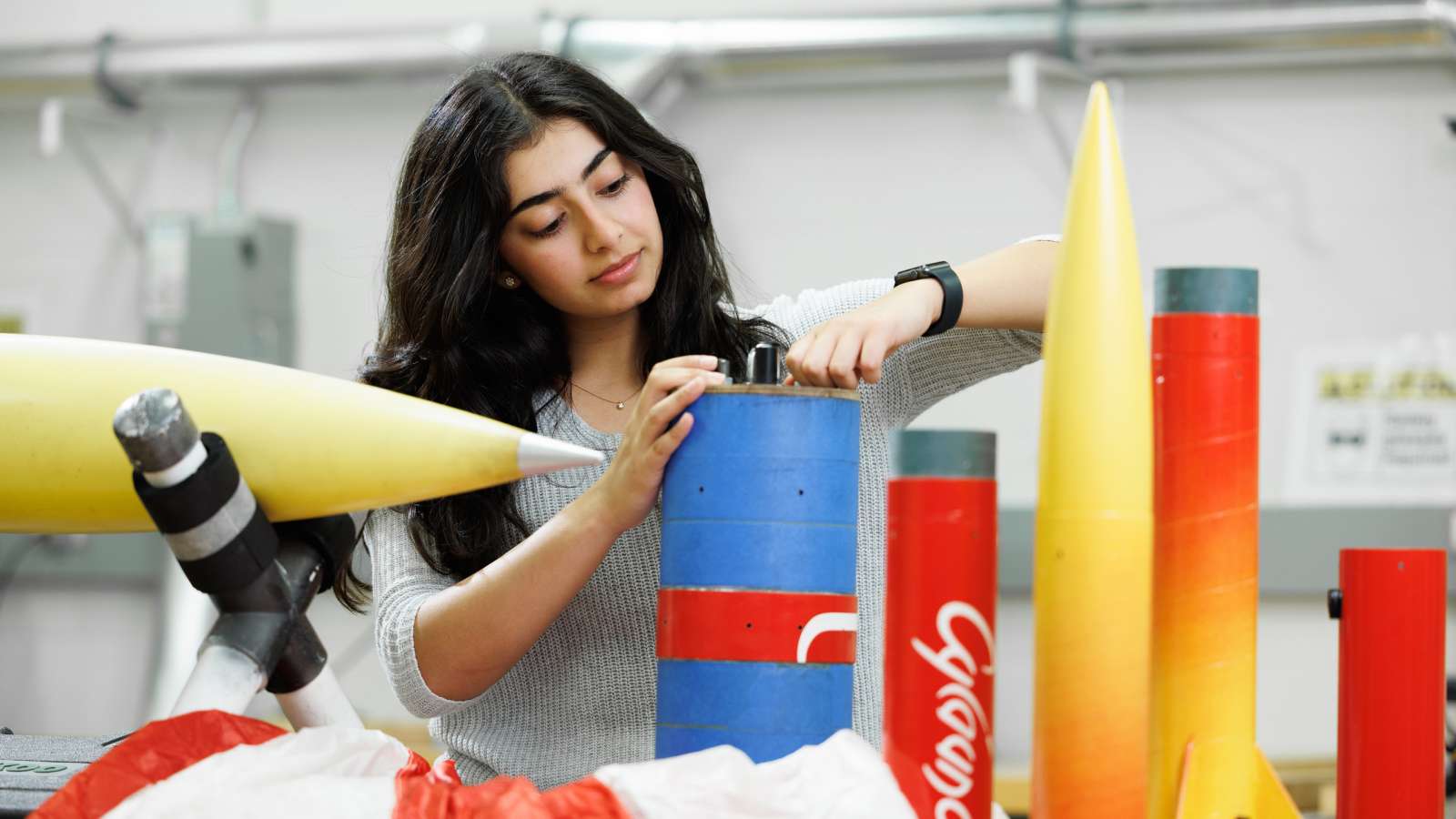Flight captured Khushi Kapoor’s imagination at an early age. Before her first birthday, she regularly took 15-hour flights with her family between the United States and India, where she was born. And her childhood included trips to aeronautics museums, where she wondered how enormous aircraft could stay aloft.
“Being over 30,000 feet in the air and traveling at speeds you can’t even imagine on the ground fascinates me every time,” Kapoor says.
With a hot job at Boeing underway, Kapoor (’22 aerospace engineering) credits a curriculum relevant to the needs of the modern aerospace industry and Iowa State’s devotion to innovation as important ingredients for launching her career. She currently works in the multinational’s Phantom Works Division in St. Louis contributing to teams working with experimental military technology.
Kapoor grew up in Iowa City and graduated from Iowa City West High School. A campus visit to Iowa State immediately made her feel at home. When her tour stopped in Howe Hall, she marveled at the jet engines that line the hallways and the cardinal-and-gold airplane suspended from the atrium ceiling. Her mind was made up. She decided to become
a Cyclone.
“I could picture myself spending a lot of time there,” Kapoor says.
Cutting-Edge Curriculum, Clubs
One of Kapoor’s courses focused on vertical takeoff and landing, or the ability of some aircraft, such as helicopters, to lift straight up off the ground without a runway. The course well positioned Kapoor for an internship during the summer of 2022 with Joby Aviation, a company in Santa Cruz, California, advancing air taxi technology.
The company is developing electric aircraft with vertical takeoff and landing capabilities to shuttle passengers between large city centers and suburban regions. The aircraft would take off vertically from rooftops and then transition into for-ward flight like conventional airplanes. This “Uber for the air” concept could slash commute times and reduce the number of vehicles on urban roadways. Kapoor’s job was to assist in the control room as a flight test engineer, monitoring various aircraft parameters.
“It was so much fun to be hands on with the aircraft,” she says. “I think out of anything you could be doing at the com-pany, that would have been the job I would have chosen, and I was lucky enough to get to do that during the internship.”
Kapoor also competed in NASA’s 2022 Student Launch rocketry competition. The Iowa State team had two semesters to build a functional, reusable rocket for the competition, which took place in April 2022 near NASA’s Marshall Space Flight Center in Huntsville, Alabama.
The competition attracted 60 teams from more than 20 states, and the rockets were judged across a range of criteria designed to mirror real-world engineering challenges drawn from NASA’s missions. Iowa State’s rocket, nicknamed Craig, took second place in the altitude award category, which recognizes teams whose rockets come closest to their declared target altitude.
Back on campus, Kapoor started ISU Go Fly, a student club dedicated to designing autonomous aerial vehicles that transport medical supplies in the developing world.
The inspiration for the club came from challenges emergency medical personnel in developing countries often experience. Delays due to poor infrastructure and other considerations can mean the difference between life and death during a medical emergency, and autonomous electrical aircraft could be an innovative piece of the puzzle to making sure remote locations have adequate medical supplies.
ISU Go Fly set about designing their own aircraft capable of meeting the challenge, and Kapoor found ways to contribute even when she spent a semester living in Iowa City working for Collins Aerospace as part of a cooperative learning/work arrangement. The team eventually assembled a prototype aircraft roughly a square foot in size by the time Kapoor graduated. The water jet labs in Sukup Hall and the Student Innovation Center’s 3-D printers and soldering tools were indispensable in bringing their designs to life.
Interacting With Execs
Kapoor pointed to the Innovation Fellows Program as one of the highlights of her time at Iowa State. The program put Kapoor in touch with executives at some of the most iconic aerospace and aviation companies in the world, and its mix of academic, entrepreneurial, and personal development opportunities helped her develop her leadership skills.
Matthew Nelson, an assistant teaching professor of aerospace engineering, was Kapoor’s advisor for one of her Innovation Fellows Program research projects on hydrogen fuel for aircraft as a substitute for conventional jet fuel.
Kapoor worked with other students to contact aviation companies developing hydrogen-fuel technology. Then the team assembled a presentation on the topic, assessing the viability of hydrogen fuel and analyzing the infrastructure it would require to become widely adopted.
Nelson says Kapoor was in “go-getter mode” throughout the project. She contributed to the team’s conversations and kept everything moving forward at critical stages, he says.
“Those experiences encouraged outside-the-classroom thinking combined with a lot of hands-on work that forces you to think on your feet,” Nelson says.
It’s that combination of hands-on learning and relevant cur-riculum Nelson says is crucial for preparing grads like Kapoor for today’s aerospace industry.
